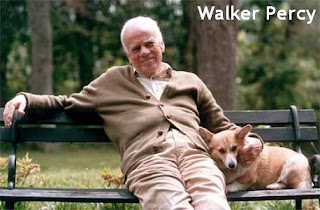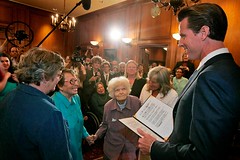Fred Leebron, one of my favorite writing teachers at
Queens University of Charlotte, talks sometimes about the idea of
transport in fiction writing. Now I often don’t know what the hell Fred is talking about, but I love him anyway because his passion for the craft is infectious. As for this transport thing, you may know very well what it is, and if so, good on ya, but I’ve had to struggle with it a bit—until now.
In Andrew Sean Greer’s novel The Confessions of Max Tivoli, I have discovered an author who masterfully and relentlessly transports us through time, space, emotion, and consciousness while at the same time keeping us firmly anchored in the story, and more specifically, in the scene, the interaction, the emotion he wants us to see and feel. He keeps us right where he wants us, but takes us everywhere at the same time.
Being the incorrigible suck-up that I am, I told Greer this (well, not all of it, but the gist of it anyway) when he appeared at Booksmith in the Haight last Thursday night. The following is an excerpt from the reading he did that night, which was from his new novel, The Story of a Marriage. The setting is San Francisco, 1953, and in this scene, the first-person protagonist, Pearl Cook, is in the backyard chatting with Buzz, an old army buddy of her husband, Holland. Pearl and Holland have a son they call Sonny, who is sickly, and a dog named Lyle. Buzz is helping Pearl hang out the laundry, and he has just called her attention to his nose, which has obviously been broken before.
I nodded. “It’s a beauty.”
“Thank you.”
“How did you get it?”
“Holland.”
The sun flashed across the billowing sheets. I blinked, turned toward Buzz, and saw him raising a hand to his face just as the sunlight stained him white all along his arm.
“Holland hit you?”
Buzz just cocked his head and watched me. Holland never raised his voice except at the radio, never hit a thing except the couch pillows before he sat down, grinning, with his cigarette. But once, of course, he’d been a different man, a man trained to shoot other men during the war, who drank, who sang with soldiers and hit a friend across the nose.
At last I asked, “Was it over a woman?”
He handed me a pair of trousers. “Yes.”
I pulled out the trouser dryer and began to stretch the pants onto it. “Tell me.”
“Pearlie,” he said. “We were born at a bad time.”
“I don’t know what you mean. It’s a fine time.”
I didn’t know what he meant by “we.” I couldn’t imagine what might bind me together with a man like Buzz, as likable as he was. I couldn’t draw any kind of line around the two of us.
“You’re proud of your house. You have a nice touch.”
“It belongs to Holland’s family.”
“It can’t be cheap,” he said to me. “I mean Sonny being sick and all.”
“Holland’s aunts help out. With the bills, the braces, it is a lot. It keeps me inside a good deal, I tell you, taking care of him,” I said without thinking. “Of course it’s no trouble,” I added hastily.
“Now what would you do if you had all the money you needed?”
I had no answer to that. It was a thoughtless question to ask a poor woman with a sick son, something only a rich man would ask. Like wondering aloud to a freshly brokenhearted girl: “What if it turns out he loved you after all?” It was something I had never allowed myself to think about. What would I have done? I’d have moved my family away from a house like that, with glaring neighbors, and stains on the basement walls from the ocean creeping in, with crickets sifting in under the doorsills with the sand…to Egypt, to Mali, to some fantasy destination I only knew from books. My God, I’d have flown to Mars with Holland and Sonny and never come back. That was the only answer I could think of. A woman like me, I couldn’t afford to name my real desires. I couldn’t even afford to know them.
All I said was, “I’ve got everything I need. I’m happy.”
“I know, but just imagine…where would you live?”
“This house is better than anything my parents had.”
“But just say…an apartment high above the city? A cliff over an ocean, with a view from your bed? Five hundred acres with a fence all around?”
“What would I do with five hundred acres?” I said without thinking.
Then he looked right at me, not a shy man at all, and I think for a moment I understood.
I stood there, staring at him, with the metal dryer contraption in my hand and the damp trousers over my arm. The sun came in full and lit the world from top to bottom; you could almost hear the jasmine reaching up for it. Then we heard the sound of Holland’s car returning and Buzz turned away.
In a moment, Holland shouted “Hey there!” from the house. I heard a bicycle bell, and Sonny heading down the hall in pursuit of love.
And Buzz said nothing else, touching his nose as if touching the memory of pain. He was half to the sun, and the shadow of his ruined hand fell across his long face in the form of another, younger hand cradling his cheek. The wind burrowed into his hair like a living creature. I didn’t say a word to him as he went inside, just continued stretching the trousers in the sun to dry. And down I went—into the green deep, flecked with gold and draped with waving plants, endless, bottomless—and forgot what I had glimpsed. I was a careful woman, a good gardener, and I pruned away the doubt. But you know the heart: every night, it grows a thorn.
So after this reading, and after I mustered the cojones to raise my hand, I mentioned this idea of transport to Greer and told him his work had helped me to better understand what it meant. I pointed out that in the excerpt he had just read, we were taken to the war, where two friends had an altercation, to the couch, where Holland grins and whacks the pillows, to Mali, to Egypt, to Mars, to the hallway of the house, forward and backward in time, and through a huge range of emotions, but we were never taken out of that tense, powerful, revealing moment between Pearl and Buzz. I then asked him about the process: I asked if the story just came out of him that way (not mentioning that if he had answered “yes” to that, I would have hunted down a straight razor and slit my wrists), or if he focused on a particular dimension of the story for a time and then did multiple passes, interleaving the various dimensions into the final, complete whole…or what?
His answer, in essence, was that a story like this one, which is essentially about a housewife who rarely leaves her house, needs a broader dimension to hold the reader’s interest. He said he feels it’s his responsibility to give the reader that broader dimension, so when he revises, when he is adding metaphors to color in the lines, he looks to do it in a way that broadens the reach of the story—taking the reader, for instance, out of the backyard and all the way to Mars. In this particular case, the book is only 198 pages, so he said he felt that these wider glances and forays have added meat to the book, making it a more satisfying read in the end.
I know that I, for one, intend to find out for myself.
Greer on His Grandmothers – and Strong Women Everywhere
As mentioned above, The Story of a Marriage is a first-person tale narrated by a protagonist who is a housewife in San Francisco in 1953. In response to a question about his use of the first person, Greer explained that he used it because wanted to deeply explore the feelings of women who had strong personalities, but were constrained by the customs and social mores of the time. This idea grew out of his experiences with and memories of his own grandmothers, both of whom were strong women who must have had to live with these kinds of constraints. He told the story of one grandmother who, when she died, left behind a bottle of Vodka hidden in the flour canister, $5,000 in bills wrapped in tinfoil, a handgun hidden in the freezer, and a box of correspondence she had written—apparently without the family’s knowledge, or at least without it becoming general knowledge in the family—to every president who had sat during her adult life.
Not sure if it was the same grandmother, but he told another story that had to do with the time he came out as a gay man to his grandmother. (“Not her favorite subject,” he said.) Shortly after he had done this, the Atlanta Olympics were about to start, not far from his grandmother’s home in Greenville County, South Carolina. Learning that Greenville County had just passed a resolution declaring homosexuality "incompatible with the standards to which this community subscribes," Greer’s grandmother wrote a letter to the Olympic Committee protesting the fact that the Olympic torch was about to be run through the county. She pointed out that Olympic rules specified that the torch could not be run through any area that had laws violating basic human rights. The Olympic Committee took action, and the torch was shrouded in a van as it passed through Greenville County. (True story. Check it out: http://www.boston.com/news/local/articles/2003/10/05/in_south_episcopal_schism_pondered/)
 Thoughts on Robert Mailer Anderson's Boonville...
Thoughts on Robert Mailer Anderson's Boonville...






